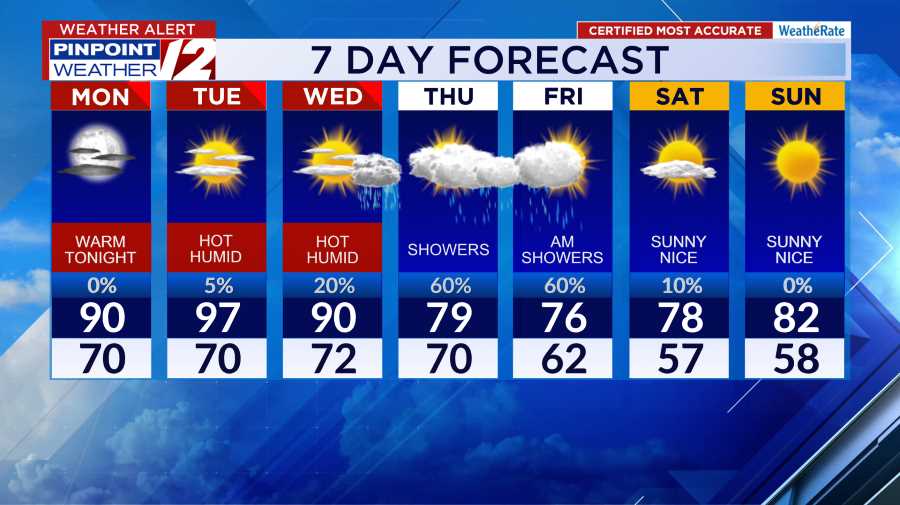PROVIDENCE, R.I. (WPRI) – The City of Providence has hit a milestone in the pandemic. Since mid-March, one million meals have been delivered to families and children in need. It’s not a milestone anyone wants to reach, because it shows the dire need for healthy, nutritious food among those in poverty, but it’s also a milestone showing the City’s readiness to respond to this crisis within a crisis, based on the infrastructure that was already in place.
In Providence, all public school students are offered free breakfast, lunch and dinner through a reimbursement program with the USDA. Those meals might be the only stable meals some students are guaranteed in a day. When school is out for the summer, the program doesn’t go away. Instead, the meals are offered at pick-up locations across the city.
Since covid-19 forced school to go remote in mid-March, the need for food returned for students who were suddenly encouraged to stay in their homes. With the infrastructure already in place, the City seamlessly continued offering meals to anyone 18 and under through the USDA reimbursed program. This time, however, they had to be cautious with pick up and delivery. Healthy Communities Director Ellen Cynar said usually, through the USDA program children are required to go to a designated food distribution site and eat their meals at the site, but during this time, the USDA granted a “grab and go” waiver, allowing the children to get their meals to eat at home. The program even switched to distribution many meals at once.
“We do multi-day food distribution so we distribute food on Tuesdays and Fridays instead of coming every single day. That enhances the ability for a family to come and get food. Food is available for any youth 18 and under so we’re also serving an age population that might not be in school but is still eligible to get these free meals. And then we know that families can’t get to the meal sites for a variety of reasons, quarantine obviously, we know that there’s fear of engaging in public places for many reasons so in some cases we’ve been doing home distribution so home delivery to families. In other cases, we have other food distribution mechanisms that we’ve been relying on and emphasizing that distribution for families who are home-bound who aren’t comfortable leaving their homes and also for older adults who are more vulnerable right now,” Cynar added.
For children, the meals are available for pickup at 14 public school sites on Tuesdays and Fridays from 11 a.m. to 2 p.m. They’re also offered at recreation centers on Tuesdays and Fridays from 4 p.m. to 6 p.m. Parents can pick the meals up on the child’s behalf, but must provide the child’s name, school and student ID number.
Of course, children aren’t the only Providence residents in need of a healthy, nutritious meal. There are also several sites set up for all ages, particularly those in the older community or immigrant community. Cynar said some people in that community are fearful of coming to pickup sites or other public areas, so there are delivery options available for them.
The goal here is healthy and nutritious food. When asked if there were issues with supply chain, as we saw at grocery stores, Cynar said she’s dealing with pallets of food, not individual meals. She said the biggest challenge there is more the distribution of perishable, healthy foods, rather than the ability to purchase them. Cynar said the foods all need to be delivered in a timely manner with opportunities for refrigeration, and that can be challenging. Add to that the fact that the local growing season has just begun, over two months into the covid crisis, making it more of a challenge to secure healthy fruits and vegetables from other parts of the world.
Each box weighs about 8 pounds.
This wouldn’t be possible without the help of volunteers. Lots of them. Hundreds of them, according to Cynar. She said faith communities are helping connect volunteers with those in need. The city is also tapping into the volunteer roster at Providence Emergency Management Agency. “That could be anything from we have a pallet of food that’s being delivered to this one location at this one time. We need three volunteers that are able-bodied and willing to unpack that…” Cynar gave as an example of the volunteer work underway.
The City is also relying on donations. City Greens, for example, is partnering with them to pack 450 bags weekly of additional food for families to supplement what the children are getting. Volunteers help to pack those bags for families to take home.
This isn’t over. Food security has always been a concern in urban environments and Providence is no different. With so many people out of work due to covid-19, the insecurity has only increased. While Rhode Island may be reopening its economy, it’s going to be some time, Cynar predicts, before people can provide their own meals, without help, once again.
If you are in need of a healthy meal, you can find out how to sign up for help by calling 3-1-1 or clicking here. There’s also a mobile app called PVD311. You can also visit that website to find out ways to help with volunteering or food donations.



















